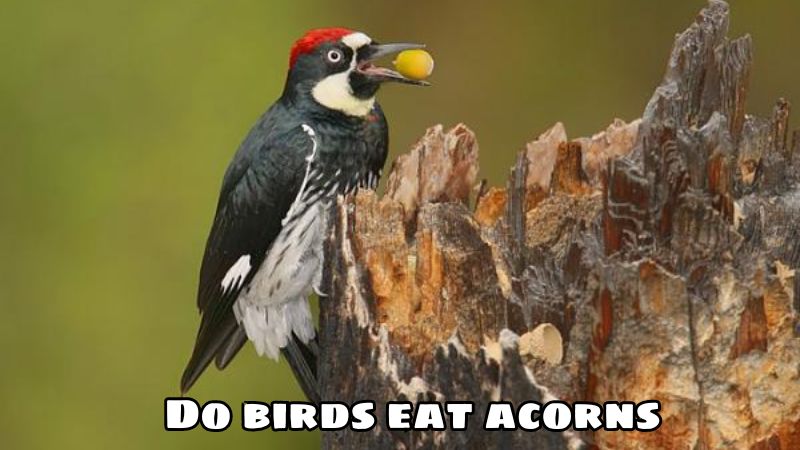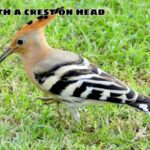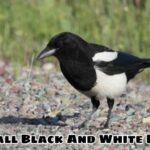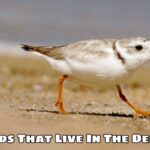The relationship between birds and acorns is an interesting topic in ecological research, attracting the attention of many scientists and nature lovers. Acorns, with their nutritious seeds, play an important role in forest ecosystems. But do birds eat acorns?
Understanding whether birds consume acorns not only helps us understand more about the eating habits of birds but also helps clarify their role in seed dispersal and maintaining diversity. biodiversity in the forest. Let’s explore in detail with Exoticbirdscorner below!
General introduction to acorns
What are acorns?
Acorns are the fruit of the oak tree, belonging to the Fagaceae family. It has an ovoid or oval shape, with a small to medium size. Acorns are covered by a hard shell, which may have small cracks or holes. The nutritional composition of acorns includes carbohydrates, proteins, fats, along with some vitamins and minerals. Although they are not the main source of nutrition for humans, they still play an important role in ecosystems.
The role of acorns in the ecosystem
Acorns are an important food source for many wildlife species such as squirrels, deer, and birds. They help maintain the balance of animals and play an essential role in forest regeneration. When acorns fall to the ground and germinate, they contribute to the growth of new oak trees, thereby maintaining and enriching the forest ecosystem.
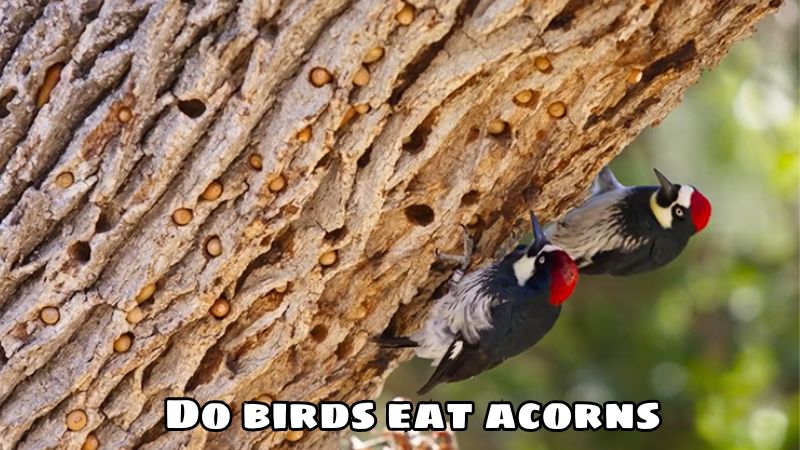
Do birds eat acorns: A special relationship
Birds eat acorns: Fact or fiction
Birds that often eat acorns: Some birds such as woodpeckers, starlings, and sparrows often eat acorns. These species are capable of consuming acorns and using them as their primary food source during fall and winter.
Reasons why birds eat acorns: Acorns provide a rich source of nutrients, including carbohydrates and fats, meeting the high energy needs of birds, especially during periods of food shortage.
How birds eat acorns:
Birds search for acorns: Birds often search for acorns by searching under oak trees or on the ground where the acorns have fallen. They use their beaks to pick up and peel acorns.
How birds peel and eat acorns: To eat acorns, birds often use their beaks to separate the hard shell and get the seeds inside. This process can require skill and patience, especially with birds with strong beaks such as woodpeckers.
The role of birds in dispersing acorns:
Birds transport acorns: When birds eat acorns, they often swallow the seeds and transport them long distances, through the digestive system and out. Acorns are dispersed through bird droppings, which help disperse the seeds to new areas.
Application of this phenomenon in forest regeneration: The dispersal of acorns by birds is an important factor in the forest regeneration process. When acorn seeds fall to the ground and germinate, they help maintain and expand the oak forest area, contributing to the sustainable development of the ecosystem.
Applications of acorns in life
Acorns in cuisine:
Acorn dishes: Acorns are used in cuisine in many different cultures. For example, in some European cultures, acorns can be processed into flour for baking or added to dishes to enhance flavor. In other areas, acorns are roasted or pureed to create traditional dishes or special preparations.
Nutritional value of acorns: Acorns contain many important nutritional components such as carbohydrates, proteins, and fats, while also providing vitamins and minerals. It is a rich source of energy, although it needs to be carefully processed to remove compounds that can cause indigestion.
Acorns in production:
Wine and dye production: Acorns are used in the production of certain wines, such as oak wine, and in the manufacture of natural dyes thanks to the tannins contained in acorn shells and nuts. These applications take advantage of the properties of acorns to create products with high economic value.
Acorns in culture:
Meaning in legends and folk tales: Acorns often appear in legends and folk tales as a symbol of strength and longevity. In many cultures, oak trees and acorns are considered sacred and carry meanings of sustainability and protection, often associated with myths and cultural traditions.
Impact of birds eating acorns on biodiversity
Positive impact:
Seed dispersal: When birds eat acorns, they help disperse seeds by passing them out after digestion. This process helps acorns fall to the ground in new areas, facilitating the germination and growth of oak trees, thereby supporting biodiversity by creating new habitats for plant species. and other animals.
Habitat creation: New oak trees that grow from acorns dispersed by birds provide habitat for many other animals, including insects, birds and frugivores, contributing to the maintenance and Expanding the forest ecosystem.
Negative effects:
Competition for food: The presence of acorn-eating birds can lead to competition for food sources among other birds and animals. When many species search for acorns, there can be a shortage of food for other species, affecting the ecological balance in the area.
Effects of climate change on the relationship between birds and acorns
Climate change and breeding season
Climate change can impact the breeding season of oak trees and birds, changing the blooming and fruiting times of oak trees, as well as when birds forage and consume acorns. These changes may reduce the synchrony between oak tree breeding times and the birds’ nutritional needs.
Change in foraging behavior
Climate change may cause birds to change their foraging behavior. For example, changes in acorn fruiting times or changes in weather conditions could affect birds’ ability to find and consume acorns, altering migration patterns or habits. their food.
Epilogue
Bird eating of acorns is not only an interesting biological phenomenon but also plays an important role in the ecosystem. Birds such as woodpeckers, starlings, and sparrows often seek out and consume acorns for their nutritional value.
This process not only provides an essential food source for birds, but also contributes to the dispersal of acorns, supports forest regeneration and maintains biodiversity. However, changes in climate may affect this relationship, altering the way birds forage and consume acorns. Understanding the relationship between birds and acorns deepens our awareness of the interactions between species and their habitats.

